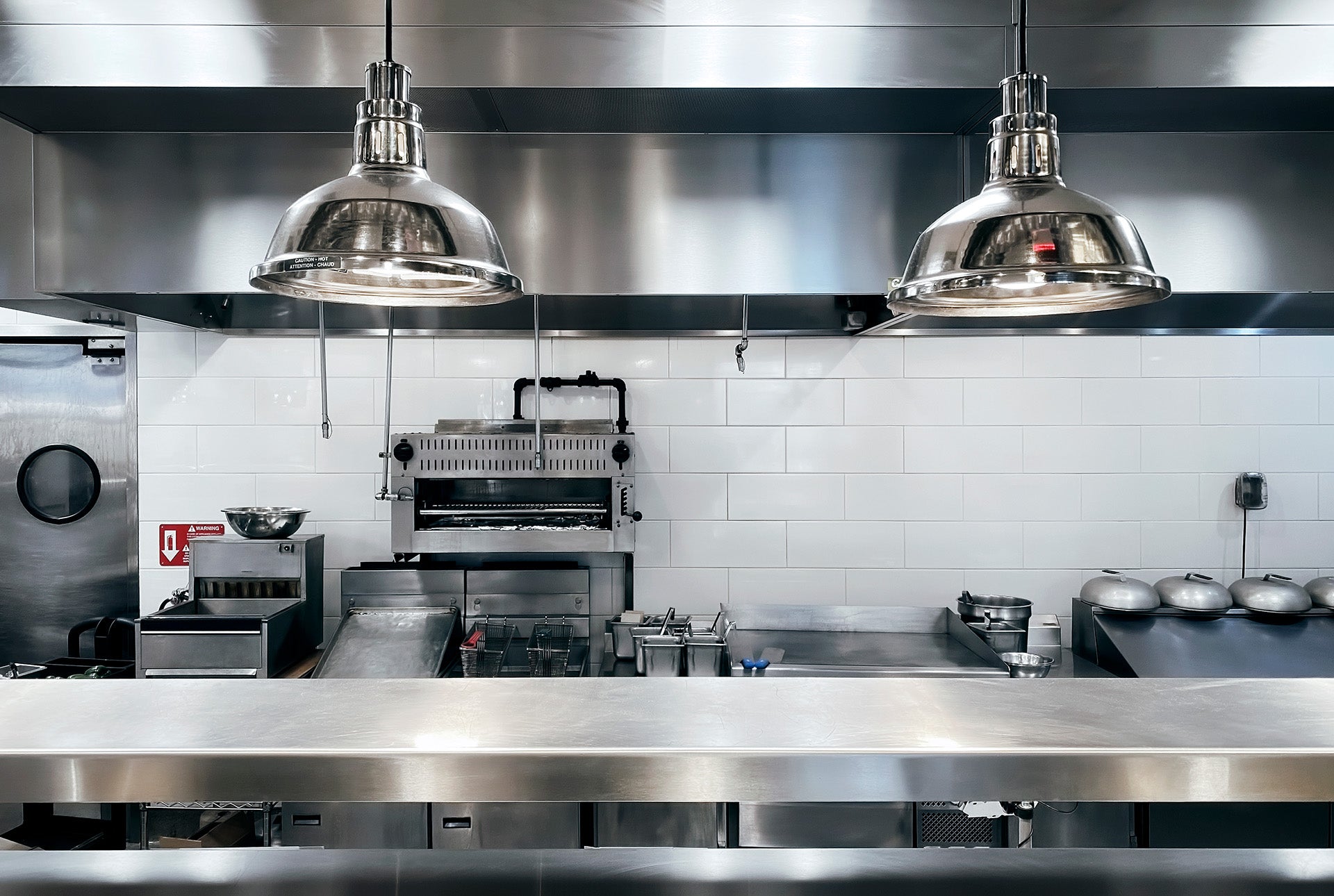Why is commercial kitchen cleaning so important?
Cleaning your commercial kitchens is important because of the risks that a dirty and unhygienic kitchen pose to staff and your customers. Some of the risks involve cross-contamination which could result in foodborne illness or allergic reactions.
Since the year 2000, 30% of all foodborne illnesses that were reported to OzFoodNet, were associated with food prepared by commercial kitchens. Foodborne illnesses from commercial kitchens are spread through hands, foods, surfaces and equipment that aren’t cleaned or separated properly. Cleaning all areas that are used to store, prepare and cook raw meats, poultry and eggs is essential in reducing and preventing foodborne illnesses from occurring.
It's also crucial to clean utensils, workspaces and cooking equipment to protect others from allergic reactions. Some allergic reactions can be fatal so it’s important to implement a system that prevents this from occurring.
Commercial kitchen cleaning is also an important factor in maintaining fire safety with 61% of all kitchen fires a result of cooking equipment that isn’t cleaned properly. If kitchen equipment and utensils are not cleaned correctly, the build-up of grease and grime in range hoods, deep fryers, cooking ranges and grills become a hazard which can lead to kitchen fires.
Cooking equipment should be cleaned and maintained daily to prevent fires in the kitchen. Your range hood being the most important piece of kitchen equipment as this is what filters those highly flammable fats and oils that build-up and become grease. This needs to be done regularly as frying and grilling produces on average 450kg per month.
Guide on What to Clean in a Commercial Kitchen
Before you clean your commercial kitchen, it’s important to understand what needs cleaning and at what stages. Some items will need regular cleaning whereas some may only need to be cleaned when doing a deep clean of your kitchen.
|
What Needs to be Cleaned? |
When should this be Cleaned? |
Why is it important to clean this? |
What should be used to clean it? |
|
Kitchen Surfaces
|
·Kitchen surfaces should be cleaned as you work.
|
·Clean kitchen surfaces especially when handling raw meats and poultry. ·Reduce the risks of food poising |
·Clean surfaces to remove dirt and grime. ·Disinfectant should be used to kill germs
|
|
Kitchen Utensils
|
·Clean equipment like cutting boards, knives and bowls regularly. ·Utensils should be cleaned after being used on raw meats and allergens.
|
·Prevent harmful bacteria found in some foods from spreading to others and to prevent cross-contamination with allergens.
|
·Cooking utensils should be cleaned in hot soapy water to prevent any bacteria from spreading around the kitchen. ·Followed-up by cleaning through a dishwasher to sanitise and dry.
|
|
Small Appliances i.e. microwaves, kettles, blenders etc.
|
·The smaller appliances in your restaurant like kettles and microwaves should be cleaned regularly, depending on use. ·This should be daily.
|
·It's necessary to clean these small appliances to prevent the build-up of grime and the cross-contamination of bacteria and allergens.
|
·Microwaves and like appliances should be scrubbed with a scourer and hot soapy water. ·Then wipe them down before sanitising. ·Appliances like kettles should be scrubbed with a long tool to remove any stubborn residue. ·Then wash to remove any debris.
|
|
Coffee Machines
|
·Coffee machines need to be cleaned daily. ·Coffee area should also be cleaned daily to avoid infestations of pests.
|
·Coffee machines can only be cleaned with specific chemicals. ·If not regularly cleaned, the machine may get clogged and will also affect the flavour of the coffee being brewed.
|
·Chemicals are used through the machine to breakdown coffee grinds that can get stuck. ·The outside of the machine should be wiped and sanitised to make sure sugar, coffee and milk are cleared.
|
|
Ovens
|
·Ovens should be cleaned at least once a week.
|
·This will prevent the build-up of grime that can cause fires.
|
·An oven cleaner and degreaser should be used when cleaning ovens.
|
|
Fridges & Freezers
|
·Fridges and freezers need to be cleaned at least once a week.
|
·This will prevent food from spoiling and ensuring no cross-contamination occurs.
|
·Your freezers and refrigerators need to be wiped down and sanitised daily. ·A weekly deep clean should occur where all food is removed. |
|
Dishwashers
|
·Dishwashers should be cleaned daily with their self-clean setting. ·A deep clean of your dishwashers should be conducted once a month. |
·This will help the dishwasher to run better as there won’t be a build-up of dirt and grime.
|
·Dishwashers should be wiped out and sanitised monthly.
|
|
Floors
|
·Kitchen floors need to be cleaned as you go to ensure any spillages are cleaned as soon as they occur. ·Floors should be thoroughly cleaned at the end of the day
|
·It’s important to clean floors daily to maintain cleanliness. ·Having clean, grease-floors prevents workplace injuries.
|
·TIP: Having a clean mop on hand will allow you to stay on top of keeping the floors clean. ·Ensure floors are swept, degreased with a mixture of cleaning chemicals, scrubbed and allowed to air dry. |
There are some areas that are often missed when cleaning kitchens. Things like high shelves and spaces in between kitchen equipment are often forgotten about as they aren’t common touch points for staff. These areas are important to clean to prevent dust build-up that can end up in food and drinks. Filters from appliances like fridges and ceilings are also forgotten for this same reason and cleaning them out has a big impact on the longevity of the appliance. Another important thing that is often forgotten when conducting a clean of your restaurant kitchen is the drains. If your drains aren’t regularly cleaned with a drain cleaner that breaks down food waste to prevent blockages.
Now that you know what needs cleaning and when, let’s explore some tips according to Bunzl Australia & New Zealand’s Facilities Management & Government Account Manager.
Tips for an Expert Clean with Thomas Walkerden
- Clean before disinfecting and sanitising. This means making sure equipment, benches and utensils are clean to ensure any dirt or grime is removed, allowing the disinfectant chemicals to kill germs.
- Designate cleaning cloths to particular areas according to industry standards i.e. blue for general cleaning, green for kitchen areas, red for bathroom areas, yellow for infectious areas. Creating a colour-coded cleaning system is one of the easiest ways to clean and stop the spread of germs and allergens in a commercial kitchen. The industry standard for hospitality is:
| Image | Information | SKU |
 |
RED: for areas that present a high risk of contamination such as toilets and bathrooms. Keeping cleaning equipment coded to be used in this specific area will prevent infections from being spread to the remainder of the restaurant or bar. | KW740 |
 |
GREEN: for kitchens and food prep areas, and bar areas. Adopting this system will reduce the risk of outbreaks and infections related to food. | KW738 |
 |
YELLOW: for areas of potential infection, such as those typically found near those Red coded ones. | KW737 |

|
BLUE: for general cleaning of low-risk areas such as tables and chairs in restaurants. | KW739 |
- Ensure cleaning equipment is always clean and in good working order. Regular cleaning of equipment and maintenance is crucial in preventing an unhygienic commercial kitchen.
- Change cleaning cloths and wipers frequently. While these can be reused regularly, make sure you are constantly using clean cloths and wipers to reduce the spread of bacteria.
- Ensure, where possible, there is proper ventilation as some chemicals can affect people with breathing difficulties.
Learn more about How to Safely Store Cleaning Chemicals.
Benefits of Creating a Commercial Cleaning Schedule
A commercial cleaning schedule is one of the most important parts of your cleaning. A schedule will help to increase productivity, keep your staff and customers safe from germs and show a commitment to providing a safe and hygienic dining experience. So, what is a cleaning schedule?
There are many benefits to a cleaning schedule in your kitchen. Having a cleaning schedule will ensure food safety by removing all grime and food residue helping you reduce the risk of cross-contamination and protecting your customers from potential infection.
Having a commercial cleaning schedule can improve the efficiency and operation of your kitchen. If your kitchen is clean and organised moving around and finding anything you need will create a better workflow, improving productivity for workers.
The cleaning schedule will also ensure that all equipment is being cleaned regularly, extending the performance lifespan of the cooking equipment.
Finally, imploring staff to work by a cleaning schedule will also improve their morale. Working in a clean and organised environment will lead to increased job satisfaction as staff will feel valued and have more motivation. This will increase workflow and productivity.
Creating a clean and hygienic commercial kitchen is important to maintaining productivity, employee satisfaction and meeting health and safety regulations.












